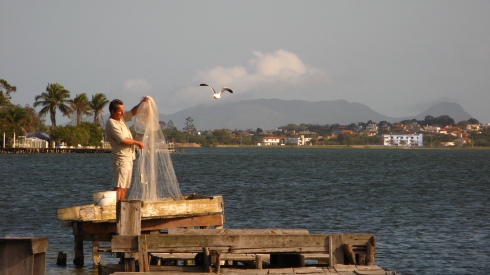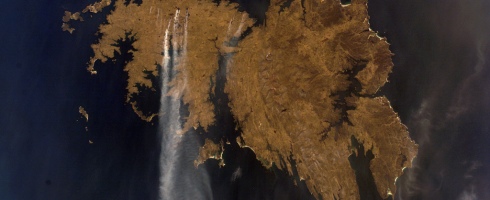My latest article on Latin America, published by Campden FB, a magazine for super-wealthy business-owning families.
There’s such a delay between when I file the copy, when it is published in print, and then when it goes live online, that some stuff seems out of date: the vagaries of publishing.
Have a read.

Can Western family offices catch a good investment in Latin America? Photo by me, Santa Catarina, Brazil. 2007
It’s accepted investment wisdom that Latin American economies offer spectacular returns for investors. The region’s economies are expected to continue to soar while Europe and North America bump along the bottom, printing more money just to survive. So is Latin America El Dorado for family offices?
Stocks on Mila, a stock market trading Colombian, Chilean and Peruvian companies on a single platform, rose in value by almost 19% in its first 12 months to May 2012, compared with the FTSE 100’s 9% rise and the S&P 500’s 12% in the same period. Brazil’s minimum wage will increase by 14% in 2012 and public expenditure on infrastructure is expected to rise.
Such numbers have the same effect on investors as micro-bikinis on Rio’s Carnival-goers. But Latin America has other attractions. It is in general more stable than it used to be (Argentina notwithstanding, see box). Such horrors as narco-trafficking and corruption are no longer as endemic as they once were in the region. Most pertinently, in many Latin American countries a massive middle class is rapidly emerging, and with that comes demand for better healthcare, retail, banking and other products and services. To meet that need, a Latin Mittelstand of dynamic, fast-growing businesses has begun to emerge; just the sort of businesses that appeal to investors.
The Latin American region still only represents a modest corner of most family office portfolios – usually between 3% and 5% – but it is increasing. Some family offices are taking advantage by buying up direct controlling stakes in growing businesses. Others are allocating capital to funds and funds of funds, channelling into the new area of middle class-targeting businesses.
So where to invest? And how? “The 800-pound gorilla in the room is Brazil,” says Paul Karger, founder of Boston-based multi family office Twin Focus Capital Partners, which invests directly in private equity in the region as well as through funds. “When you’re investing in Brazilian public equities most of that exposure is in the big commodity names – Petrobras [pictured, right] and Vale,” he says. The problem with such investment is that “you’re not really playing this emerging middle class, the 40 or 50 million middle-class consumers coming online needing all different sorts of products, technologies, education, insurance”. Investing in other countries can play into this story more effectively. “If you look at a market like Chile, it’s pretty mature,” Karger says. “Great regulatory system, transparency and so on. There are some incredibly compelling opportunities.”
Colombia is also seeing strong interest from investors in Europe. With more experienced managers who have plenty of experience with North American and European partners – and with Moody’s recently raising the country’s credit rating to investment grade – family offices are keen. “I wouldn’t even have thought about going there 10 years ago, let alone investing there. But if you go to Bogota or Medellin today you’ll see cities that are robust and bustling with commerce; people feel safe there,” says Karger. “I see a couple of private equity opportunities there each month; all they need is the foreign direct investment to provide the next layer of growth.”
Vitally important when moving into a new region is finding the right partners. Investment advisers helping European family offices access the region for the first time say they avoid the global finance names operating there and seek out the local banks, investment managers and local family offices with which to co-invest. Not only are the fees charged by local operators much lower, they are the only partners who really understand the environment, the risks and opportunities on the ground. Plus, the local families have skin in the game and an interest in picking winners.
The best tactic is to look for local managers who have spent time in Europe or North America. They understand the local market, and also the viewpoint of a western investor in Latin America for the first time. “There are groups locally who are well respected but the real problem is finding one who understands the mentality of the investor,” says an experienced Argentinian family office investment adviser, who has worked out of Europe for 20 years and helps European investors find Latin American partners. “In Brazil you’ve got lots; there are a few in Colombia, Mexico, Peru and Chile, but in Argentina, Uruguay and Paraguay there is only a handful.”
Corinna Traumueller, chief executive of Family Office Management Consulting, which works with families all over the world, says: “Family offices want a partner who can give them a good estimation of the risks in that region, especially political instability, in places like Brazil or Argentina; they’re asking now how Latin America can fit into their portfolio. They’ve done land investments there, they’ve done commodities there, and now they are interested in small businesses where they can invest significantly in a venture opportunity with a local partner.” She says a number of her clients in New York and Miami are particularly keen on Latin America, although the Europeans on her books have so far not taken the plunge.
Traumueller says the private banks, family offices and advisers that have those local contacts, and which host the networking events that bring Latin American families and funds together with potential investors, are the gatekeepers to the region. “More and more investment networks are popping up to bring together co-investing families of a similar size,” she says. “But there is still no one good way to facilitate those meetings.”
Therefore a good, trusted partner is invaluable. Rampart Capital, a London-based multi family office, relies on a principal partner, Brazilian bank BTG Pactual, for its pipeline of local investment opportunities, introductions to local managers and for local due diligence. “Most families are overweight in their own markets, so when you try to go outside it, and try to find a good local partner, you’re starting with a blank sheet of paper asking: ‘Who do I know?’” says Graham Noble, partner at Rampart. “At BTG Pactual I know the principals and most of the senior executives. They still treat their investors as partners, which is a rarity. It’s a question of trust; if they’re doing a proprietary trade I know they’re putting a significant amount of their own cash into it. That sort of relationship is a prerequisite for a lot of families going into Latin America.”
Don’t get hung up on getting a board seat, says Noble. “Good shareholder agreements and the proper paperwork will get you to where you want to be. If you can get the right local partner who is putting their own cash into a deal, and you’re comfortable with their abilities, you don’t need to be that actively involved,” he says. “The hardest bit is to find that good local partner, someone who will enhance your return on capital, and if everything happens to go south they are the same person who will help you to get out of it with a minimal loss.”
Personal contacts can help, of course. When he was looking at the region, Rod Walkey, managing director of Latin America Alternatives Management and formerly chief investment officer at Migration Capital, the family office for the founders of Fortune 500 technology company EMC Corporation, teamed up with a Harvard MBA classmate who used to be the portfolio manager for the Petrobras pension plan’s private equity group.
“I interviewed several private equity managers in Brazil and came to the conclusion that it was going to be difficult to find the best managers on my own,” says Walkey. “You want locals that have done at least one fund and can show a track record. I searched for a fund of funds but there was no good alternative, so I wrote a business plan for one of my own. Through my study at Harvard I met my business partner, who had invested $1.5 billion into just about every local fund manager in Brazil. He had a very deep scorecard system and all the analytical tools that have tracked the market for five years; it shows me who the real players are down there, where the best deals are, and that means we get entry valuations far lower than foreign funds can.” Together Walkey and his partner built a $400 million private equity fund of funds investing into mid-caps in Latin America.
Amid the excitement, a quick reality check. Investing in Latin America is not a sure-fire winner. SAP forecasts growth in Latin America to slow from 4% in 2011 to 3.5% in 2012 and 3.6% in 2013, and believes the region will be prone to shocks as Europe’s economic shifts play out. Emerging markets including Latin America will see more capital inflows from abroad as they post stronger growth than advanced economies, the agency says, but warns “there will be periods of reversal and tighter financing conditions”.
And while there are undoubtedly opportunities, foreign investors might well find it tough to get hold of the real peaches. The very best local investment houses and family offices often don’t need to co-invest with outsiders. “Perhaps they don’t need the capital, or they don’t want to share,” says Rampart’s Noble. Walkey agrees that this can be a problem. “Most of the money going into the local funds is from pension plans,” he says. “In my opinion, the best local managers are the ones who aren’t looking for money outside their market, because they have a sufficient supply from their home market from those pension funds.” The ones who are looking abroad are the ones who have to. El Dorado hasn’t been found just yet.

A food market in Salta, Argentina. Photo by me, 2007
Wealth and soberania
Cristina Fernandez de Kirchner’s decision in April to nationalise the 51% stake in Argentinian oil company YPF that Spain’s Repsol owned is a reminder of the risks posed by investing in some Latin American economies. Two weeks later, neighbouring Bolivia – already in The Hague with British utility operator Rurelec over its nationalisation of that company’s Bolivian assets – nationalised the country’s main power grid, owned by Spanish firm Red Eléctrica Corporación.
Repsol says it will pursue compensation; possible tariff punishments are threatened by the European Union, and EU trade commissioner Karel De Gucht says it may take the case to the World Trade Organization.
Economic arguments are put forward to explain nationalisation; the pretext that foreign owners had not invested sufficiently to make the assets work for their host countries.
Beneath that is the thorny issue of sovereignty – soberania – and votes. The spectre of colonialism is a common lever among some Latin American governments desperate for the popular vote. As China’s dominance in Latin America grows, there are fears Argentina will write more protectionist investment rules, as did Brazil in 2011 over foreign land ownership. “Argentina is going in the same direction because of Chinese and Middle Eastern investors in the region. Governments want to be careful how much of their resources are owned by foreigners,” says one Argentinian family office investment adviser. “Argentina has fallen off the map as far as investors are concerned.” That said, FOMC’s Traumueller says families she speaks with put Argentina second on their list of interests after Brazil.
The China effect
A sign that growth in Latin America is sure to increase is the Chinese interest in the region. Thirsty for more natural resources to fuel its growth, China has $43.9 billion (¤33.78 billion) invested in Latin American stocks, according to the Latin Business Chronicle, citing data from China’s Ministry of Commerce. Chinese exports to Latin America were valued at $121.7 billion in 2011 while the value of its imports from the region reached $119.8 billion. FOMC’s Traumueller, who has some new family office clients in China, says while they have made no investments in the region yet, they are enquiring about it. “They are part of an emerging market themselves and operate businesses taking risks every day in those markets, so they are now looking for a safe haven for their money further afield than their usual favourites in Europe, such as Germany,” she says. “As Europe has become unstable, they’ve started looking elsewhere.”









